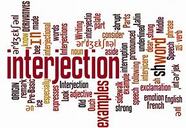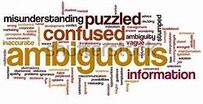
My favorite soap box topic is “Know the rules. If you then choose to break them, it should be on purpose, not out of ignorance.” And, preferably, for a reason you can articulate. After all, words are the tools of the writer, so let’s get them right.

Since this article is aimed at fiction writers, you don’t need a grammar lesson on parts of speech. However, it never hurts to remind yourself every now and then. I had learned – at least a hundred and fifty years ago – that there were eight parts of speech, but I found nine listed in Wikipedia.
1) Noun; 2) Verb; 3) Adjective; 4) Adverb; 5) Pronoun; 6) Preposition; 7) Conjunction; 8) Interjection; and 9) Article or (more recently) Determiner.
I must have lost one over the years and, frankly, the term “determiner” was new to me in this context. Ah, well… It really doesn’t matter. We all know everything in English grammar overlaps just about everything else at one time or another.

The best definition of an “Interjection” ‒ for me as a writer – is this: “An interjection is a word or expression that occurs as an utterance on its own and expresses a spontaneous feeling or reaction.” https://en.wikipedia.org/wiki/Interjection
Some grammarians deem interjections as least important of the nine parts of speech because they are not generally required in order for the meaning of the sentence to be clear. That might be true for technical writing and some non-fiction but, in fiction, anything that expresses on the page a spontaneous feeling or emotion is important.
Words on the page is all writers have to work with.
This part of speech occurs most often in informal dialogue, interrupting the flow of conversation with a word or phrase that indicates the speaker’s or view point character’s emotion or reaction to the content of the discussion. They are also found in letters or other written communications between people, or even in internal thoughts.
Almost any word or part of speech can be used as an interjection, but they are usually one or two words followed by an exclamation point. The interjection “Oh, gosh!” is a complete and grammatically correct sentence although it doesn’t have the requisite verb and subject.
https://grammar.yourdictionary.com/parts-of-speech/interjections/what-is-an-interjection.html.
Who knew? Not many of the writers who judge writing contests… in my experience, anyway.

“Onomatopoeia” has been one of my favorite words since grammar school, probably because it sounded so strange and no one else in my class could spell it.
Onomatopoeia is the process of creating a word that phonetically imitates, resembles, or suggests the sound that it describes. Such a word itself is also called an onomatopoeia, and it is not a part of speech but more of a figure of speech.
The purpose of this literary device in writing is to add sensory description and depth to your writing. The reader can almost hear those sounds as they read through a written work. The words mimic the sounds, painting a more visual picture, and help the writer show and not tell.
There are a large variety of these categories of words: animal sounds, water sounds, music sounds, people sounds, ad infinitum. Good vocabulary and creative use of onomatopoeia can help a writer conquer the dreaded cliché by their coming up with a fresh description or by simply using one or two words.

I’ve come full circle. Remember, I was concerned only about correct spelling, and I found this lovely list of “Interjections” which gave me the spelling I was looking for. In addition, the list contained words I suspected were not interjections: “belch”, for example.
Except in the case of little boys and teenagers, a blech is a spontaneous utterance and can definitely interrupt a conversation, but I challenge anyone to convince me the word “belch” expresses a feeling or reaction to the conversation. One might intuit physical feelings of the “belcher”, but the word is not intended to do so, and stomach upset most likely has nothing to do with the conversation. The same goes for a sneeze, a fart, and a number of other basic – or base – human onomatopoeia.
Keep in mind that onomatopoeia and interjections are two different concepts. They are not the same although many words can be both, as well as being a noun or verb at the same time. While there are many onomatopoeic words used correctly as interjections, it’s not all the time that an interjection imitates sounds. People don’t commonly use “oink” as an interjection in a conversation.
Just be cautious with lists from the internet unless you are confident of the writer’s credentials.
LITERARY PREVARICATIONS
Onomatopoeia mimics a sound. Interjections interrupt with a spontaneous word or phrase that expresses a feeling or reaction related to the conversation. And either one might be both, depending on context and punctuation. What could be simpler?
Still a source of ambiguity for me are words or human sounds which simply prevaricate. They are Time buyers. Place holders for a pause. A momentary lull in order to redirect one’s attention or to think of what to say, how much to say, a substitute for not knowing the answer when you should, etc. We’ve all been there.

Time buyers show up on lists of Interjections and, occasionally, on lists of onomatopoeia. The operative thought being that often they are intended as neither.. Some of the most obvious examples, from various lists, with explanations – by others, not me – of what they mean:
“ahh… ” ‒ this means relief or delight.
"er” ‒ (sometimes “erm”) plays for time.
“hmm” ‒ extended as needed, suggests curiosity, confusion, consternation, or skepticism.
“huh” ‒ a sign of disbelief, confusion, or surprise. With a question mark, repetition.
“mmm” ‒ conveys palatable or palpable pleasure.
“oh” ‒ is among the most versatile of interjections. Use it:
• to indicate comprehension or acknowledgment;
• with question mark, a request for verification;
• to preface direct address (“Oh, sir!”);
• as a sign of approximation or example (“Oh, about three days”);
• to express emotion or serves as a response to a pain or pleasure.
“sst” / “psst” ‒ calls for quiet or may be intended to attract someone’s attention.
“uh” ‒ is an expression of skepticism or a delaying tactic.
“umm” ‒ is a placeholder for a pause but also denotes skepticism.

My point is that when writing fiction meanings should not be ambiguous. I’m convinced most authors want their readers to understand what they’re reading – unless the author is making something confusing or ambiguous on purpose. That’s okay.
The potential pitfall comes with the author who knows what the words and sentences mean, what the characters are thinking, their backgrounds, and everything that ultimately goes into the meaning of their words, actions, and thoughts.
Most of the time, the rest of the dialogue and actions render an interjection or onomatopoeia perfectly clear, so it is only occasionally that there might be some confusion. And if the author is aware of the possibility, he or she will most likely select the best words.
For example, when there could be doubt about the intent, the word “shh” is more likely to be understood as “be quiet”, “stop talking”, or “stop making noise” than the word “ssst”, which might be someone trying to attract someone’s attention without being too obvious.
Also, consistency can make a difference. I have a spy character who always hums “Mmm” when he can’t or doesn’t want to answer his girlfriend’s questions. He does not use that sound to mean anything else, not even – and I quote – palatable pleasure, which is the definition or feeling given to “Mmm” by one of the list-makers.
JUST SAYIN’
□
Note: See my "Resources" page for the best list I found for interjections, plus a few other I added from other lists.
Sources:
https://www.macmillandictionary.com/thesaurus-category/british/written-representations-of-sounds
https://surveyanyplace.com/the-ultimate-interjection-list/
https://blogs.transparent.com/english/onomatopoeia-the-sounds-we-make-and-how-to-spell-them/
http://writtensound.com/index.php
https://www.dailywritingtips.com/100-mostly-small-but-expressive-interjections
https://www.howtolinks.com/how-to-spell-grunt-sounds
https://www.sciencedirect.com/science/article/abs/pii/S0378216614002422
https://www.researchgate.net/publication/271141148_distinguishing_onomatopoeias_from_interjections
https://en.wikipedia.org/wiki/Onomatopoeia
https://thinkwritten.com/onomatopoeia/
https://writingexplained.org/grammar-dictionary/onomatopoeia
https://writingexplained.org/grammar-dictionary/interjection
https://grammar.yourdictionary.com/parts-of-speech/interjections/what-is-an-interjection.html
https://www.examples.com/education/onomatopoeia-sentence-examples.html
https://www.writersdigest.com/write-better-fiction/grammar-rules-for-writers
https://www.noslangues-ourlanguages.gc.ca/en/quiz/jeu-quiz-onomatopees-interjections-onomatopoeia-eng
https://www.gigapromo.com/?q=grammar%20writing%20book&asid=giga_us_ba_gc4_02&de=c&ac=10025&cid=316705730&aid=1364494360306783&kid=kwd-85281133597227:loc-190&locale=en_us&msclkid=fedb7e152b6e1604564d1e743375519c
https://www.thoughtco.com/sounds-in-english-language-3111166#:~:text=%20the%2018%20consonant%20sounds%20%201%20b:,yawn%2018%20z:%20zipper%20and%20zap%20more
https://www.teacherspayteachers.com/Product/Writing-with-Sound-Interjections-Exclamations-and-Onomatopoeia-Words-4572492
 RSS Feed
RSS Feed